Mister Rogers gently shares 'the biggest mistake' parents can make in poignant resurfaced clip
"That's why when you're a parent, you have a new chance to grow."
Fred Rogers in 1988.
Fred Rogers, as many know, had a sort of magic about him. The way in which he soothed both children and their parents through his empathy, patience, and kindness was unique and rare. For him, imagination knew no bounds, and it was important to let kids truly explore the wondrous snippet of time that you get to be a kid.
In a clip making the rounds on social media, Rogers is being interviewed on Oprah Winfrey's show in 1985. Winfrey asks him, "What do you think the biggest mistake parents make in raising their children?" Rogers breathes in and answers, "Not to remember their own childhood."
He continues, "I think the best thing we can do is to remember what it was like for us and know what our children are going through."
Winfrey reminds him, "But you know it's so hard once you get to be a parent, you always say 'I will never do this' when your mother is doing it to you or your father is doing it to you. And then you get to our age and you forget what it was like to be this size. You really do forget."
Rogers patiently responds, "But those children can help reinvoke what it was like. And that's why when you're a parent, you have a new chance to grow."
This really resonates in the comment sections of the many places this clip is posted. On Positive Life Secrets' Instagram post, one person writes, "I love this man so much. He was a gift to children everywhere."

Another truly takes what he says to heart: "Breaking the cycle of verbal abuse, manipulation, and arguing! I don’t want my kids to go through what I went through. So, I just have to remember what it felt like."
This Instagrammer adds some input: "A lot of parents miss the mark when they think respect doesn’t go both ways. When they shame their child versus building confidence and having understanding and helping them navigate properly. Truth is a lot of people are not right as adults and they are raising people."
This running theme of not forgetting one's childhood is something Rogers discussed often. In a YouTube clip from the early 80s, Rogers sits down with children and their parents and digs deep into where there might be a disconnect. The kids describe their moms and dads, while the parents (at times frustrated) share their vulnerable difficulties setting limits, getting angry, or truly seeing their child's point of view.
- Mr Rogers sits down with families and listens. www.youtube.com
Rogers, as he so often did, listens patiently to the entire family dynamic and reiterates the importance of empathy. He says to the parents, "Often we wonder if we're alone. And I think it's programs like this that help people realize that they're not alone. That there are a lot of people in the world who are struggling with such things as, 'What do I do when my kid just will not listen to something that I know is right for them?'"
A commenter shares, "I really needed this. As a 90’s baby now raising her own kids, it was nice to know Mr. Rogers is still able to teach me. I need to get back to this type of lifestyle and living. Thank you for posting this. It really helped me in a time of need."

